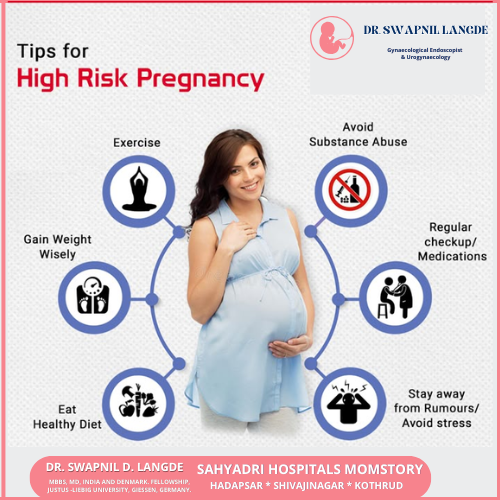Pregnancy is a life-changing journey, but when classified as high-risk, it requires extra care and attention. A high-risk pregnancy doesn’t mean complications will happen—it simply means that you or your baby may need closer monitoring and support. With the right guidance and a proactive approach, a high-risk pregnancy can lead to a healthy outcome. Dr. Swapnil Langde, a specialist in managing high-risk pregnancies, shares essential tips to help expecting mothers stay healthy and prepared.
What Is a High-Risk Pregnancy?
A pregnancy is considered high-risk when there are greater chances of health problems for the mother, baby, or both. This could be due to:
- Maternal age (under 17 or over 35)
- Pre-existing conditions (diabetes, hypertension, thyroid issues)
- Multiple pregnancies (twins, triplets)
- History of miscarriage or premature birth
- Obesity or underweight issues
- Lifestyle factors (smoking, alcohol, poor nutrition)
Top Tips to Manage a High-Risk Pregnancy
1. Choose a Trusted High-Risk Pregnancy Specialist
The first and most important step is choosing a qualified doctor like Dr. Swapnil Langde, who has extensive experience in managing complicated pregnancies and offering personalized care.
2. Follow a Tailored Prenatal Care Plan
Attend all scheduled appointments and follow the specific prenatal care plan designed for you. Regular monitoring helps detect and address any issues early.
3. Eat a Nutrient-Rich Diet
Focus on a balanced diet with adequate iron, calcium, protein, folic acid, and fiber. Avoid processed foods, excess sugar, and caffeine.
4. Stay Hydrated and Rest Well
Drink plenty of water and get 7–9 hours of sleep daily. Rest helps your body recover and supports fetal development.
5. Take Prescribed Medications and Supplements
Never skip or self-adjust your medications. Dr. Langde may prescribe supplements like folic acid, iron, and calcium to support a healthy pregnancy.
6. Avoid Harmful Substances
Stay away from alcohol, tobacco, and drugs. Limit exposure to chemicals or strong medications unless approved by your doctor.
7. Monitor Your Health Closely
Track your blood pressure, sugar levels, weight gain, and fetal movements as advised. Report any unusual symptoms immediately.
8. Practice Gentle Exercise
If allowed, engage in safe activities like walking, prenatal yoga, or stretching. It improves blood flow, mood, and reduces pregnancy discomfort.
9. Manage Stress Effectively
Use techniques like meditation, deep breathing, and guided relaxation. Mental well-being is vital during a high-risk pregnancy.
10. Prepare for Delivery Early
Discuss birth plans, possible interventions, and delivery options with Dr. Langde. Being mentally and physically prepared reduces anxiety as your due date approaches.
When to Seek Immediate Medical Attention
Call your doctor if you notice:
- Severe headaches or vision changes
- Vaginal bleeding or fluid leakage
- Sudden swelling in hands/face
- Decreased fetal movement
- Severe abdominal pain
Your Pregnancy, Your Strength – With Expert Support
With the right care and constant support, high-risk pregnancies can lead to healthy and happy births. Dr. Swapnil Langde provides compassionate, expert-led pregnancy care to ensure both mother and baby remain safe throughout the journey.

